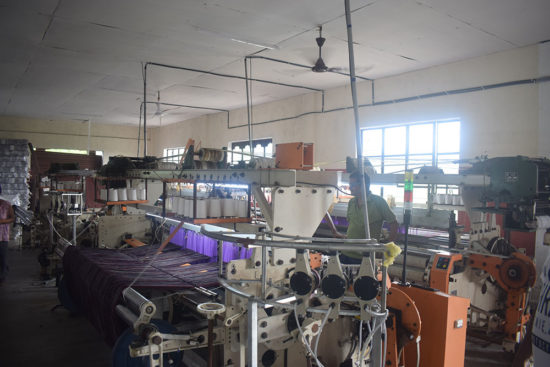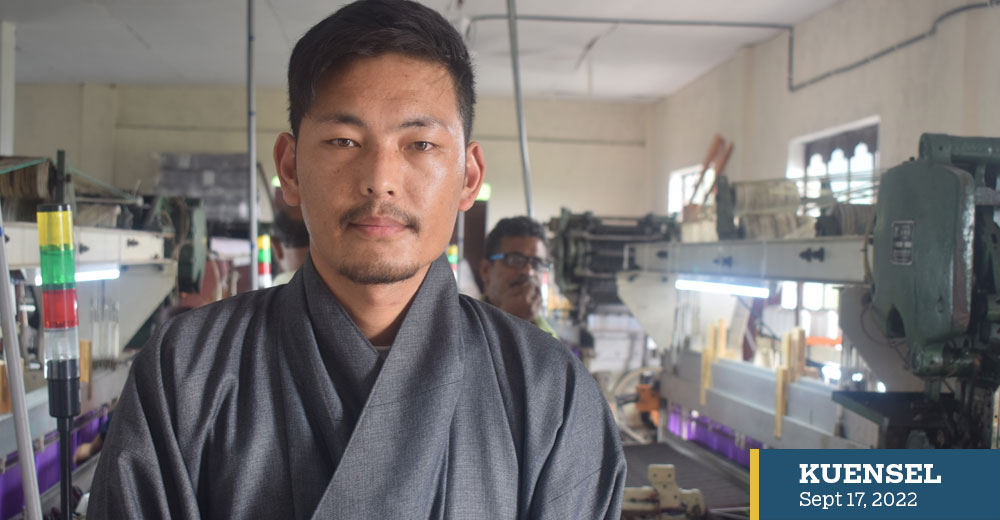Rajesh Rai | Phuentsholing
Only two industries at Dhamdum Industrial Park (DIP) in Samtse have started production. One is Druk Textile, a fabric-manufacturing establishment.
Located at the farthest corner of the 349-acre park, the one-storey factory is standoffish. But inside it, there are machines and men at work, and the sound is deafening.
It is the country’s first fully fledged fabric manufacturing plant.
The industry aims to supply fabrics for schools, government and private office uniforms across the country.
A 32-year-old Bachelor of Business Administration (BBA) graduate and a former tour guide, Tshering Dhendup, originally from Chamkhar, Bumthang saw the opportunity while with tourists before the Covid-19 pandemic struck.
“While I was telling them all the good things about Bhutan, one of them saw a group of students and asked if their uniform material was manufactured in Bhutan,” he said. He was embarrassed to say it was imported. “That is when the idea to start a textile industry struck me.”
Tshering Dhendup had deliberately taken a BBA course to get into business but until his foreign guest’s remarks, he didn’t have the textile business in mind.
Today, although Druk Textile has supplied just 200-metres of fabrics to two clients, the prospect is unlimited.
“We are in touch with the tailors’ association in Thimphu and they are willing to purchase from us,” Tshering Dhendup said. “They want to stitch student uniforms for all the schools in the country.”
The tailors’ association has proposed this idea to the labour ministry and it is currently under discussion.
Druk Textile is also receiving enquiries from retailers who deal in school uniforms across the country. But they will only be able to buy in the next academic session.
Other than fabrics, Druk Textile will also start tailoring to cater readymade school uniforms in Samtse. Some tailors have already been recruited. It has a total of 13 employees at present and plans to recruit 11 more tailors.
Although the tailoring section is in the same building, Tshering Dhendup said a different unit would be constructed for tailoring on one-acre land at DIP.
A total of Nu 15 million (M) has been invested so far in construction, purchase of machinery and raw materials. Nu 4.7M was a loan from the National Cottage and Small Industry Development Bank Limited.
Although everything looks perfect today, Tshering Dhendup said he faced many challenges before he started production.
“Funding was the biggest challenge I went through,” he said. “It was more difficult due to the pandemic.”

Due to Covid-19-related restrictions, Tshering Dhendup said that transportation expenses shot through the roof. Labour was another problem. Machinery was brought on time but they were left idle as the import of skilled workers who could assemble was restricted.
The main raw material, yarn, is imported from India.
“I got in touch with a cotton growing cooperative in eastern Bhutan but it was expensive. So I dropped it,” Tshering Dhendup said. “Given the one-time instalment expenses and cheaper electricity, the production cost is still cheap. Manufacturing is a lucrative business and we can compete in the international market.”
Tshering Dhendup said he has learned many things in the last two years.
“Young and aspiring entrepreneurs must understand that one has to take risks to do a business,” he said. “We are a developing country and there are many opportunities. But most youths are only looking for a stable income. I have laid the foundation for the textile industry in Bhutan.”


